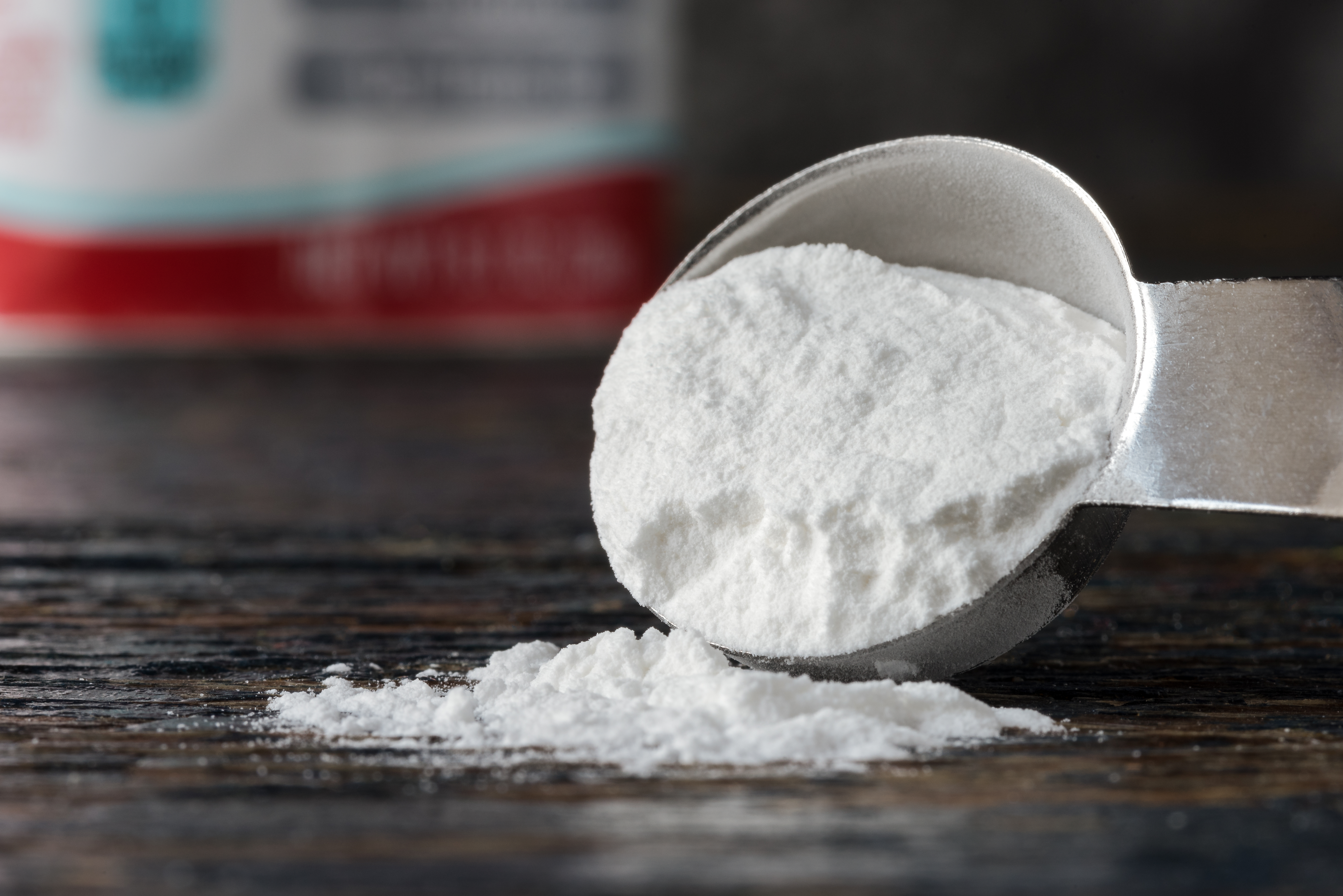Have you ever dug through your pantry, stumbled upon an old can of baking powder, and wondered if it’s still safe to use? You’re not alone.
Many of us find ourselves questioning the safety of expired kitchen staples. Baking powder is a common ingredient in countless recipes, but does it pose any health risks once past its prime? Your curiosity about whether expired baking powder can actually make you sick is valid.
We’ll dive into the facts and myths surrounding expired baking powder. We’ll explore how it affects your health and whether it’s worth the risk. Keep reading to uncover the truth and ensure your culinary creations remain both delicious and safe.

Credit: www.livestrong.com
What Is Baking Powder?
Baking powder is a common kitchen ingredient. It helps baked goods rise. You see it in cakes, cookies, and breads. It makes them fluffy and soft. Many people use it without thinking twice. But what exactly is baking powder?
Composition And Purpose
Baking powder contains three main components. These are an acid, a base, and a filler. The acid is usually cream of tartar. The base is often baking soda. Cornstarch is the common filler. The filler keeps the acid and base dry. This ensures they don’t react until mixed with liquid.
The purpose of baking powder is simple. It makes baked goods rise. The acid and base react with water. This reaction creates carbon dioxide gas. The gas forms bubbles in the dough or batter. The bubbles help the baked item rise and become light.
Role In Baking
Baking powder plays a crucial role in baking. It is a leavening agent. This means it helps doughs and batters rise. Without it, cakes would be dense and heavy. Cookies would be flat and chewy. Bread would lack the airy texture.
Baking powder works quickly. It acts as soon as it meets moisture. This is why recipes often mix dry and wet ingredients separately. Once combined, the baking process should start soon. Delays can lead to less rise and a denser product.
Shelf Life Of Baking Powder
Baking powder is a staple in many kitchens, but how often do you check its expiration date? You might be surprised to find an expired can lurking at the back of your pantry. Knowing the shelf life of baking powder can help you avoid culinary mishaps and ensure your baked goods rise to perfection. But does expired baking powder pose a health risk, or is it merely ineffective? Let’s explore this and more.
Expiration Dates Explained
Understanding expiration dates is crucial. Baking powder typically has a shelf life of 6 to 12 months when unopened. After opening, its effectiveness begins to wane, especially if not stored correctly. Expired baking powder won’t make you sick, but it might leave your cakes flat and disappointing. Check the expiration date stamped on the packaging and remember that it’s a guideline for optimal performance.
Storage Conditions
Proper storage is key to extending the life of your baking powder. Moisture and heat are its biggest enemies. Store it in a cool, dry place, ideally in an airtight container to prevent exposure to humidity. Have you noticed a clumpy texture or strange odor? These are signs that your baking powder might be compromised. Always use a dry spoon to avoid introducing moisture.
If you’re like me, you’ve probably had that moment of panic during baking when you realize your baking powder is expired. Before you toss it, test its potency. Simply mix a teaspoon of baking powder with hot water. If it bubbles vigorously, it’s still good to use. This simple test can save your recipe and your day.
So, next time you reach for that trusty can, take a moment to check its date and storage conditions. It could mean the difference between a cake that rises to the occasion and one that falls flat.
Effects Of Expired Baking Powder
Expired baking powder loses its effectiveness, impacting your baked goods’ texture and rise. While it won’t make you sick, it can result in flat, dense treats. Always check the expiration date to ensure your recipes turn out as expected.
When you rummage through your pantry and find a forgotten tin of baking powder, you might wonder if it’s still good to use. The effects of expired baking powder can go beyond just affecting your baked goods. It’s important to understand how it can impact both your baking results and your health.
Impact On Baking Results
Baking powder is a leavening agent that helps your cakes and muffins rise. Its potency diminishes over time. You may notice your baked goods turning out flat, dense, or lacking the fluffy texture you expected. Imagine trying to impress your friends with a homemade cake, only to find it’s more like a pancake.
What happens if you use expired baking powder in a recipe? Your cookies might spread too much, or your bread could become a brick. It’s frustrating to spend time and effort only to end up with disappointing results. To prevent this, check the expiration date and test its effectiveness by mixing a teaspoon of baking powder with hot water. If it fizzes, it’s still good.
Health Risks
Can expired baking powder make you sick? It’s less likely to cause illness compared to other expired foods, but it’s not entirely risk-free. Baking powder contains both acidic and alkaline components that can degrade over time, potentially leading to chemical changes.
Consider how expired baking powder could affect your digestive system. While the risk is low, using expired baking powder might lead to mild stomach discomfort or a strange aftertaste in your food. Should you take the chance? It’s wise to err on the side of caution. Why risk any discomfort or spoil the taste of your meal when a fresh packet is just a grocery trip away? Your health and the quality of your food are worth the investment.
Ultimately, expired baking powder is best avoided. You have the power to make informed choices about what you use in your kitchen. Keep an eye on expiration dates and prioritize your health and culinary success.

Credit: food-hacks.wonderhowto.com
Testing Baking Powder’s Freshness
Baking powder is crucial in baking. It helps cakes rise and gives them texture. But expired baking powder might not work well. Testing its freshness is easy. You can try simple tests at home to check.
Simple At-home Tests
To test baking powder’s freshness, use a small bowl. Add one teaspoon of baking powder. Pour half a cup of hot water over it. Fresh baking powder will bubble vigorously. No bubbles? It’s time to replace it.
Another test uses vinegar. Mix a spoon of baking powder with vinegar. Fresh powder will fizz and react instantly. No fizz means it’s expired.
Signs Of Ineffectiveness
Expired baking powder shows certain signs. Your baked goods may not rise well. They might turn out dense and heavy. The taste could be off or flat.
Cakes might become dry or crumbly. You might notice a lack of fluffiness. These are signs your baking powder is no longer effective. Time to get a new one.
Safe Usage Tips
Understanding the safe usage of baking powder is crucial for health. While expired baking powder may not cause illness, using it wisely ensures safety. Here are some tips to use baking powder safely.
Proper Storage Techniques
Keep baking powder in a cool, dry place. Moisture can cause clumping and spoilage. Use airtight containers to preserve freshness. Avoid storing near heat sources like stoves or ovens. Regularly check the expiration date for safety.
Alternatives And Substitutes
If baking powder is expired, try alternatives like baking soda. Combine baking soda with an acid like lemon juice or vinegar. This creates a similar reaction for rising. Use self-rising flour for baking recipes. It contains baking powder and salt, simplifying baking.
Credit: www.tiktok.com
Frequently Asked Questions
What Happens If I Use Expired Baking Powder?
Expired baking powder may not help baked goods rise properly. Your cakes and breads might turn out flat or dense. Test its potency by mixing with hot water. If it fizzes, it’s still effective. It’s best to replace expired baking powder to ensure optimal baking results.
How To Tell If Baking Powder Has Gone Bad?
Test baking powder by mixing a teaspoon in warm water. Fresh powder bubbles vigorously. No reaction indicates it’s expired. Store in a cool, dry place to maintain freshness. Check the expiration date on the package for guidance. Regularly testing ensures your baked goods rise properly.
Can I Use 10 Year Old Baking Soda?
Using 10-year-old baking soda is not recommended for baking. It loses potency over time. For cleaning purposes, it might still work but test it first for effectiveness. Always check its texture and smell before use. Fresh baking soda ensures better results in recipes.
How To Compensate For Expired Baking Powder?
Mix baking soda with cream of tartar to replace expired baking powder. Use 1/4 teaspoon baking soda and 1/2 teaspoon cream of tartar for every teaspoon of baking powder. This combination activates the dough, ensuring your baked goods rise properly.
Adjust the quantities based on your recipe’s requirements.
Final Words
Expired baking powder may not make you sick. It loses effectiveness over time. Fresh ingredients always ensure the best baking results. Check the label for expiry dates. Proper storage prolongs its shelf life. Keep it dry and cool. Avoid moisture exposure.
Smell and taste can indicate quality. Use your senses before baking. Baking powder plays a key role in recipes. Expired powder impacts texture and rise. Prioritize safety and quality in your kitchen. Trust fresh ingredients for delicious treats. Enjoy baking with confidence and care.

Leave a Reply